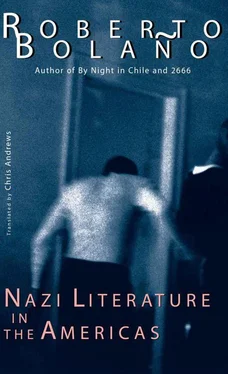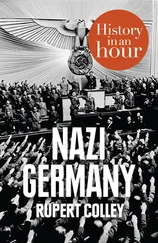He made a living giving lectures and readings all around the country. He was married and divorced four times, although he always said that the love of his life was Margaret Hogan. Time mollified his literary invective: there is a yawning gulf between the aggressive sarcasm of “Negative of John Brown” and the Olympian serenity of the ailing poet in “Homage to a Vine Street Dog.” He remained firm in his disdain for Jews and homosexuals to the end, although at the time of his death he was beginning, gradually, to accept African Americans.
Pittsburgh, 1952–Laguna Beach, 2017
Rory’s father, the poet Marcus Long, was a friend and disciple of Charles Olson, who used to spend a few days each year at the Longs’ house in Aserradero, Arizona, near Phoenix (where Marcus was a professor of American literature); a brief, pleasant stay in the company of one of his cherished disciples. So it was in all probability the master himself (and the boy’s father, of course) who taught young Rory the right way to read a book of poetry, and gave him his first lessons in projective and non-projective verse. Alternative scenario: hiding under the porch, Rory listened to them talking, while the Arizona dusk settled into eternal fixity.
In any case, to summarize: non-projective verse conforms to traditional versification; it is personal, “closed” poetry, in which it is always possible to detect the self-regard of the citizen-poet, fondling his navel or his balls, complacently displaying his joys or woes; by contrast, projective verse, exemplified on occasion by the work of Ezra Pound and William Carlos Williams, is “open,” the poetry of “displaced energy,” written according to a technique analogous to “composition by fields.” In a word, and to fall into the very same hole as Olson, projective verse is the opposite of non-projective verse.
Or that was how young Rory Long saw it, anyway. “Closed” poetry was Donne and Poe, Robert Browning and Archibald McLeish; “open” poetry was Pound and Williams (but not all of their poems). “Closed” poetry was personal: by the individual poet for the individual reader. “Open” poetry was impersonal: the hunter (the poet) tracking down the memory of his tribe for the recipient and constituent of that memory (the reader). And Rory Long supposed that the Bible was “open” poetry, and that the great multitudes moving or crawling in the shadow of the Book were ideal readers, hungry for the luminous Word. And this enormous, empty edifice was complete in his mind before he reached the age of seventeen. He was energetic then as ever and he set to work immediately. He had to populate and explore the edifice, so the first thing he did was to buy a Bible since he couldn’t find one in the house. And then he began to memorize passage after passage, and saw that the poetry spoke directly to his heart.
At twenty he became a preacher in the Church of the True Martyrs of America, and published a book of poetry that no one read, not even his father, who, being a true son of the Enlightenment, was ashamed to see his son crawling with the other crawlers in the shadow of the great Nomadic Book. But no failure could daunt Rory Long, who was already tearing through New Mexico, Arizona, Texas, Oklahoma, Kansas, Colorado, Utah and back to New Mexico, on a whirlwind, counter-clockwise tour. And that was more or less how Rory Long felt: in a whirl, inside out, guts and bones on display; disillusioned with Olson (but not with projective and non-projective verse), whose poems, when he finally read them (which he was slow do to — dazzled by the theory and his own ignorance), seemed almost fraudulent (after reading The Maximus Poems , he vomited for three hours); disillusioned with the Church of the True Martyrs of America, whose members could see the plains of the Book but not its centrifugal force, not the volcanoes and underground rivers; disillusioned with the times — the seventies, full of sad hippies and sad whores. He even considered killing himself! But instead he went on reading. And writing: letters, plays, songs, television scripts and movie screenplays, unfinished novels, stories, animal fables, comic-strip plots, biographies, economic and religious pamphlets, and above all poetry, in which he blended all the foregoing genres.
He tried to be impersonal: he wrote visitor’s guides to the Book and survival kits for explorers of the Book. He got two tattoos: a broken heart on his right arm, which symbolized his quest, and a book in flames on his left arm, which symbolized his calling. He experimented with oral poetry: not shouting or onomatopoeia, nor the wordplay of the zombies who seem to belong to a tribe parallel to, but different from, the people of the Book; not the whispers of a farmer remembering childhood and sweethearts, but a voice that spoke in warm, familiar tones, like a radio host at the ends of the earth. And he befriended radio hosts, to see if he could learn something from them, like how to recognize the impersonal voice roaming America’s radio waves. A tone at once colloquial and dramatic. The voice of the man-who-is-all-eyes wandering around until it finds the consciousness of the man-who-is-all-ears. And so, as the years went by, he moved from church to church and house to house, publishing nothing (unlike his peers), remaining obscure, but writing, submerging himself in the muddy waters of Olson’s theory and other theories, weary but open-eyed, worthy son and heir (in spite of himself) to the poet Marcus Long.
When he finally emerged from the underground, he seemed a different man. He was thinner (he measured six foot one and weighed 132 pounds) and older, but he had found the way or at least some short cuts that would soon lead him to the Great Way itself. He had begun preaching for the Texan Church of the Last Days, and his political ideas, which had been muddled in former times, were clear and coherent now. He believed in the necessity of an American resurrection. He believed he knew the quite unprecedented characteristics of that resurrection. He believed in the American family: its right to receive the manifold, true message, and its right not to be poisoned by Zionist messages or messages manipulated by the CIA. He believed in individuality and America’s need to resume the space race with renewed vigor. He believed that a large part of the Union’s body was infected with a mortal disease and that a surgical intervention was required. Having put Olson and his father, but not poetry, behind him (he published a successful collection of short stories, poems and “thoughts” entitled Noah’s Ark ), he devoted himself to spreading his message in the Southwest. And in that he was successful too. The message spread. Via radio waves and video cassettes. It was that simple. And although the past was fading more and more quickly, sometimes he wondered how it could have been so hard to find the true way.
He grew fat (at one point he weighed 265 pounds) and rich, and soon he went where rich people go: California. There he founded the Charismatic Church of Californian Christians. And he had so many followers and it was so easy to spread the Message that he even had time to write sarcastic and humorous poems: texts that made him laugh, and his laughter transformed them into mirrors reflecting his face, unblemished, alone in some Texan room, or with strangers as fat as he was, who called themselves his friends, his biographers, his representatives, at charity dinners within other charity dinners. For example, he wrote a poem in which Leni Riefenstahl makes love with Ernst Jünger. A hundred-year-old man and a ninety-year-old woman. Bones and dead tissue bumping and grinding. God in heaven, said Rory in his big malodorous library, Old Ernst is riding her hard, showing no mercy, and the German whore is crying out for more, more, more. A good poem: the eyes of the elderly pair light up with an enviable brightness; they suck at each other so hard their old jaws creak, while they glance sidelong at the reader, hinting at the lesson. A lesson clear as water. It is time to put an end to democracy. Why are so many Nazis still alive? Take Hess, for example, who would have made it to a hundred if he hadn’t committed suicide. What makes them live so long? What makes them almost immortal? The blood they spilled? The flight of the Book? A new level of consciousness? The Charismatic Church of California went underground. A labyrinth where Ernst and Leni went on fucking, unable to uncouple, like a pair of dogs on fire in a valley of sheep. In a valley of blind sheep? A valley of hypnotized sheep? My voice is hypnotizing them, thought Rory Long. But what is the secret of longevity? Purity. Searching, working, preparing for the millennium on various levels. And some nights he felt that he was touching the body of the New Man with the tips of his fingers. He lost a hundred pounds. Ernst and Leni were fucking in the sky for him. And he realized that this was no vulgar, if torrid, hypnotic therapy, but the veritable Host of Fire.
Читать дальше












